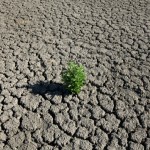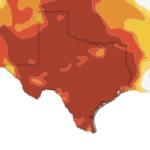Raise the Steaks! Beef Prices Soar

Photo by DAMIEN MEYER/AFP/Getty Images
Cattle prices are breaking records as ranchers rebuild their herds after the drought.
If you’re getting ready for summer grilling season, be warned. You can expect the price of steaks and hamburgers to be higher this summer. The reason is that cattle prices are nearly double what they were last year.
The drought that struck Texas in 2011 caused the state cattle industry to lose over three billion dollars. With little rain, grass simply didn’t grow, and ranchers had to buy hay at record-high prices from as far away as Montana. Many ranchers sold off their herds, which resulted in the largest decline in the beef cow inventory in Texas history.
But as that dry weather reduced supply, recent wet weather has increased demand.
Seeing rains across much of the state, ranchers are now trying to rebuild their herds. That’s brought the price of cattle higher than it’s ever been. Cows that would have cost $1,800 dollars last year sold for nearly $3,000 at a recent auction, according to the Associated Press.
The price hike isn’t unexpected. In December, Peter Bonds, Vice President of the Texas and Southwestern Cattle Raisers Association, predicted this would happen. “When it does rain, we ranchers will start retaining heifers to build these cow numbers back. There’s going to be a time there when there’s actually going to be less beef on the market,” he told StateImpact Texas at the time.
Adding to the demand end are increasing exports to Canada, Mexico, Korea and Japan, says Stan Bevers, an Economist with the Texas Agrilife Extension Services at Texas A&M University.
“Over the last six to eight months, a lot of other countries want to import our beef and when you get low supply and high demand that tends to make prices go somewhat ballistic,” Bevers told StateImpact Texas.
He expects it will all translate into higher prices at butcher counters and in grocery stores for the next two to three years.
“I think it’s been pretty well documented. From last year beef prices were up seven, eight, nine percent higher at the super markets. We could probably see that again over the next couple of years very easily,” Bevers said.

